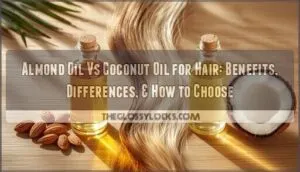This site is supported by our readers. We may earn a commission, at no cost to you, if you purchase through links.
Most hair oil debates miss a quiet detail: two drops can tip the balance from frizz to silken strands. Picture running your fingers through your hair and catching on brittle ends—then feeling them smooth, flexible, nearly weightless an hour later.
The real choice isn’t about which bottle wins a beauty contest, but how almond oil vs coconut oil for hair feels, absorbs, strengthens, and transforms on your scalp. Each oil draws from its own tradition and science; what works for one head of hair might fall flat for another.
That’s where real insight begins, and it’s simpler than you might expect.
Table Of Contents
Key Takeaways
- Almond oil works best for fine or oily hair, boosting shine, softness, and scalp comfort without heaviness.
- Coconut oil penetrates deeply, making it ideal for thick, dry, or curly hair by preventing protein loss and providing lasting moisture.
- Both oils can protect against heat styling, but almond oil has a higher smoke point while coconut oil excels at reducing breakage.
- Mixing almond and coconut oils can enhance shine, reduce frizz, and strengthen hair for a balanced, healthier look.
Key Benefits of Almond Oil for Hair
Almond oil has a reputation for making hair look and feel its best. If you’re curious about what sets it apart, you’ll find several standout benefits.
Here’s what almond oil can do for your hair.
Shine and Smoothness Enhancement
Regarding boosting hair shine, almond oil stands out. Its emollient action fills cuticle gaps, smoothing strands and increasing light reflection. You’ll notice improved oil absorption, better protein retention, and reduced hair porosity—all leading to silkier texture. Here’s how almond oil enhances shine and smoothness:
- Cuticle smoothing
- Light reflection
- Protein retention
- Hair porosity reduction
- Effective oil absorption.
Almond oil is beneficial for hair care treatments that promote healthier hair.
Frizz and Flyaway Reduction
After you boost hair shine, you’ll want to tackle frizz and flyaways. Almond oil acts like a shield, smoothing the cuticle and taming static for better hair manageability. Its lightweight feel means you get frizz control without heaviness, even in humid weather.
Almond oil can also be used as a natural hair moisturizer to help soften and smooth hair. For fine hair types, almond oil offers humidity resistance and quick damage repair, keeping strands sleek and polished.
Strengthening Hair and Roots
Once your hair feels smoother, the next step is building strength from root to tip. Almond oil delivers Follicle Nourishment and Root Hydration, supporting Hair Follicle Health and Breakage Reduction.
Its vitamin E, biotin, and fatty acids help with Protein Retention and Growth Promotion, making your hair more resilient. You’ll notice less Hair Breakage and a stronger, fuller look over time.
Scalp Health and Irritation Relief
Once your roots feel stronger, you might notice your scalp needs extra care. Almond Oil’s antiinflammatory action soothes irritation and helps with dandruff, while its Oil Antimicrobials support Scalp Health.
For daily Scalp Hydration and Skin Repair, gentle massages work well. Just remember, if you have Allergy Concerns, avoid almond oil and consider Treatment Timing for best results.
Softness and Manageability
Imagine your hair gliding through your fingers—Almond Oil makes that possible. Its Oil Absorption fills gaps for noticeable softness, while Cuticle Smoothing tames rough strands.
You’ll find Detangling Ease and less frizz, especially if your Hair Type is fine or oily.
Compared to Coconut Oil, Almond Oil excels in Hair Elasticity and manageability, making daily Hair Care simpler.
Key Benefits of Coconut Oil for Hair
Coconut oil stands out for its unique way of caring for your hair. If you’re wondering what makes it so popular, there are some key benefits you won’t want to miss.
Here’s what coconut oil can do for your hair.
Deep Moisturization and Nourishment
Ever wondered why coconut oil feels like a drink of water for thirsty hair? Its lauric acid structure allows deep cuticle penetration, locking in moisture and boosting scalp hydration.
You’ll notice real texture improvement and lasting hair softness. For dry strands, coconut oil’s hair nourishing power outperforms almond oil, making hair moisturizing and hydration truly simple.
Prevention of Protein Loss and Breakage
When you use coconut oil before shampooing, its exceptional oil penetration shields hair proteins from washing damage. That’s why coconut oil excels at cuticle protection and elasticity improvement, reducing hair breakage and protein loss far better than almond oil.
You’ll notice stronger strands, less snapping, and real damage reduction—especially if your hair faces heat or chemical stress.
Promotion of Hair Growth
Looking for a boost in hair growth? Coconut oil stands out for its deep shaft penetration and strong protein retention. By improving blood circulation and supporting a healthy scalp microbiome, it creates an ideal setting for follicle regeneration.
While almond oil fights oxidative stress, coconut oil’s unique properties make it the go-to choice in any hair oil comparison for practical hair growth tips.
Dandruff and Scalp Care
Struggling with stubborn dandruff? Coconut oil’s antifungal properties target the root cause—fungal infections—while supporting a healthy scalp microbiome for lasting results. You’ll see better treatment efficacy with coconut oil, especially on dry scalps. Almond oil helps soothe sensitive scalps, but its oil comedogenicity and mild effect make it less potent for dandruff.
- Fights scalp fungi
- Boosts hydration
- Reduces itchiness
- Soothes irritation
Instant Shine and Silkiness
Think of coconut oil as a polish for dull strands—its deep Oil Absorption Rates and Hair Porosity Reduction smooth the cuticle, boosting Light Reflection Properties for instant Hair Shine. You’ll notice Shiny Hair and improved Hair Texture and Appearance right after application.
Compared to Almond Oil, coconut oil’s Cuticle Smoothing Effects and Lasting Shine Retention make it ideal for silkier, glossier results.
Almond Oil Vs Coconut Oil: Core Differences
Almond oil and coconut oil each bring something unique to your hair care routine. Their differences go beyond just how they feel or look. Here’s what sets them apart.
Nutrient Composition
Nutrient composition shapes what each oil does for your hair. Almond oil delivers a blend of fatty acids, Vitamin E, and minerals that strengthen roots and boost shine. Coconut oil, rich in lauric acid and Vitamin E, penetrates deeply for protein protection.
Here’s a quick breakdown:
| Oil Type | Fatty Acids | Vitamin Content | Mineral Profile |
|---|---|---|---|
| Almond Oil | Oleic, linoleic | E, A, B, D | Magnesium, calcium |
| Coconut Oil | Lauric, caprylic | E, K | Trace minerals |
Texture and Absorption
Texture shapes how hair oils feel and work. Almond Oil’s lightweight texture glides on easily, leaving minimal hair residue and a smooth surface texture. Coconut Oil, with its thinner viscosity, absorbs at a faster rate and penetrates deeper.
Here’s a quick comparison:
| Oil Type | Oil Viscosity | Absorption Rate | Penetration Depth |
|---|---|---|---|
| Almond Oil | Lightweight | Slow | Moderate |
| Coconut Oil | Thin | Fast | Deep |
Suitability for Hair Types
If you’re weighing oil benefits for hair, your hair type is key. Almond Oil suits fine to medium strands and sensitive scalps, absorbing gently without heaviness. Coconut Oil is best for thick, curly, or high-porosity hair, tackling dryness and damage.
Here’s a quick hair type guide:
| Hair Type | Best Oil |
|---|---|
| Fine/Oily | Almond Oil |
| Thick/Curly/Dry | Coconut Oil |
Shelf Life and Storage
Now, let’s look at shelf life and storage. Oil rancidity is a bigger concern for almond oil, which oxidizes faster and lasts 6–12 months. Coconut oil resists spoilage, holding up for 24–36 months. Proper storage—cool, dark, airtight—extends shelf life. Watch for spoilage signs like sour odor or cloudiness.
Here’s a quick comparison:
| Oil Type | Shelf Life |
|---|---|
| Almond Oil | 6–12 months |
| Coconut Oil | 24–36 months |
Choosing The Best Oil for Your Hair Type
Picking the right oil for your hair can make a big difference in how it looks and feels. Your hair type and daily routine play a big role in what works best.
Let’s break down the options so you can choose with confidence.
Fine and Oily Hair Needs
Ever wondered why fine hair falls flat after using heavy oils? For your hair type, almond oil is a game changer. It aids sebum production balance, delivers lightweight hydration, and improves volume retention without buildup. You get scalp comfort and shine enhancement—minus the greasy feel coconut oil can cause.
- Boosts shine and manageability
- Maintains volume and fullness
- Aids a comfortable, balanced scalp
Dry, Coarse, or Curly Hair Solutions
For dry, coarse, or curly hair, you need moisture that lasts and promotes curl pattern health. Almond oil provides lightweight hydration, smoothing cuticles and enhancing bounce. Coconut oil dives deep for intensive nourishment and breakage prevention.
Try oil application styles like the LOC method for moisture retention. Both oils aid scalp soothing techniques, making your hair care routine more effective for your hair type.
Sensitive Scalp Considerations
For sensitive scalp care, almond oil stands out with its hypoallergenic profile and low comedogenic rating, making moisture retention gentle and safe. If your scalp reacts easily, almond oil is often the better choice for hair care and scalp health advice.
Coconut oil offers microbiome balance but can clog pores, raising allergy risks for some. Patch testing is key before full use.
Everyday Use Vs Intensive Treatments
Did you know daily application of almond oil suits most routines, while coconut oil shines in intensive hair treatment masks? For a balanced hair care routine, consider these points:
- Almond oil reduces product build-up with daily use.
- Coconut oil’s masking frequency is best weekly.
- Treatment duration matters—overnight for coconut, 30 minutes for almond.
- Watch for scalp reactions.
- Alternate oils for greatest benefits.
How to Use Almond and Coconut Oil for Hair
If you’re wondering how to make the most of almond and coconut oil for your hair, there are a few practical ways to start. Each method brings out different benefits, depending on your hair’s needs.
Let’s look at some simple options you can try at home.
Pre-Shampoo and Leave-in Treatments
Think of your hair as a thirsty sponge—how you use Almond Oil or Coconut Oil matters.
PreWash Treatment with Almond Oil softens cuticles and eases detangling, while Coconut Oil shields strands from water damage.
For Leave-in Treatment, Almond Oil suits daily use, especially on fine hair, while Coconut Oil excels in overnight treatments for dry, high-porosity hair.
Adjust application techniques and treatment frequency to fit your needs.
DIY Oil Blends and Hair Masks
Ever wondered how DIY Recipes can transform your hair’s health? Mixing Almond Oil and Coconut Oil in DIY Hair Masks delivers a real Hydration Boost, Shine Enhancement, and Damage Repair.
Add honey or yogurt for extra Scalp Health benefits. These blends work for all hair types, making Hair Masks an easy way to nourish, soften, and strengthen at home.
Application Tips for Maximum Benefits
After blending your hair oil mask, use the Sectioning Technique—divide hair into 4–6 parts for even coverage. Massage Warm Oil gently into your scalp and focus on Problem Areas, like dry ends.
Stick to the right Application Frequency, and always rinse with a mild shampoo Post-Application. These steps reveal the full benefits of almond oil and coconut oil in hair care.
Mixing Oils for Enhanced Results
Once you’ve mastered the basics, mixing almond oil and coconut oil unlocks Synergistic Effects for your hair. This blend boosts Improved Delivery of nutrients, enhances Hair Compatibility, and gives you better Damage Protection. You’ll notice Augmented Shine and lasting Hair Nourishment—think of it as Natural Hair Care with a customized touch.
Blending almond and coconut oils creates a powerful, personalized boost for shine, nourishment, and lasting hair protection
- Balanced moisture
- Softer strands
- Less breakage
- Fewer flyaways
- Healthier scalp
Frequently Asked Questions (FAQs)
Can almond or coconut oil cause allergic reactions?
Yes, both almond oil and coconut oil can trigger allergic reactions, especially in those with nut or coconut sensitivities. Reaction severity varies, from mild skin irritation to rare anaphylaxis.
Diagnosis methods and oil processing affect Allergy Prevalence and risk.
Is it safe to use these oils on colored hair?
Oil and Dye don’t always mix perfectly. While Almond Oil rarely causes Color Stripping, Coconut Oil can lead to Product Buildup and Scalp Sensitivity.
Patch Testing is wise before any Hair Treatment Options to protect against Hair Damage.
How often should you apply hair oils weekly?
Oiling frequency depends on your hair condition and scalp health. Dry or curly hair benefits from hair oil 2–3 times weekly, while normal or oily hair needs less—once a week or every two weeks, adjusting for seasonal changes and individual needs.
Do these oils protect hair from heat styling damage?
When you style with heat, both almond oil and coconut oil offer hair protection. Almond oil’s high smoke point gives better heat tolerance, while coconut oil helps prevent protein loss and forms a protective barrier, supporting overall hair health.
What are the side effects of overusing hair oils?
Using too much hair oil can trigger follicle blockage, scalp infections, hair damage, allergic reactions, and even hair loss. An oily scalp can worsen scalp condition treatments.
Both coconut and almond oil have drawbacks if overused.
Conclusion
Sometimes, less is truly more—yet with almond oil vs coconut oil for hair, a single drop can make all the difference. Both oils promise transformation, but your hair’s needs decide which path works best.
Think of each bottle as a tool, not a cure-all. Whether you crave softness, strength, or scalp relief, the right oil becomes part of your daily rhythm.
Choose thoughtfully, and let your hair’s texture guide you toward lasting, healthy change—one drop at a time.
- https://www.ncbi.nlm.nih.gov/pmc/articles/PMC8421184/
- https://pubmed.ncbi.nlm.nih.gov/20129403/
- https://www.pureoilsindia.com/article/almond-oil-vs-coconut-oil-which-is-better
- https://littleextralove.com/blog/hair-care/how-use-coconut-almond-oil-for-hair-benefits
- https://www.shankara.in/blogs/shankara-blogs/10-almond-oil-benefits-for-skin-hair-and-overall-health-surprising-facts-you-didn-t-know











